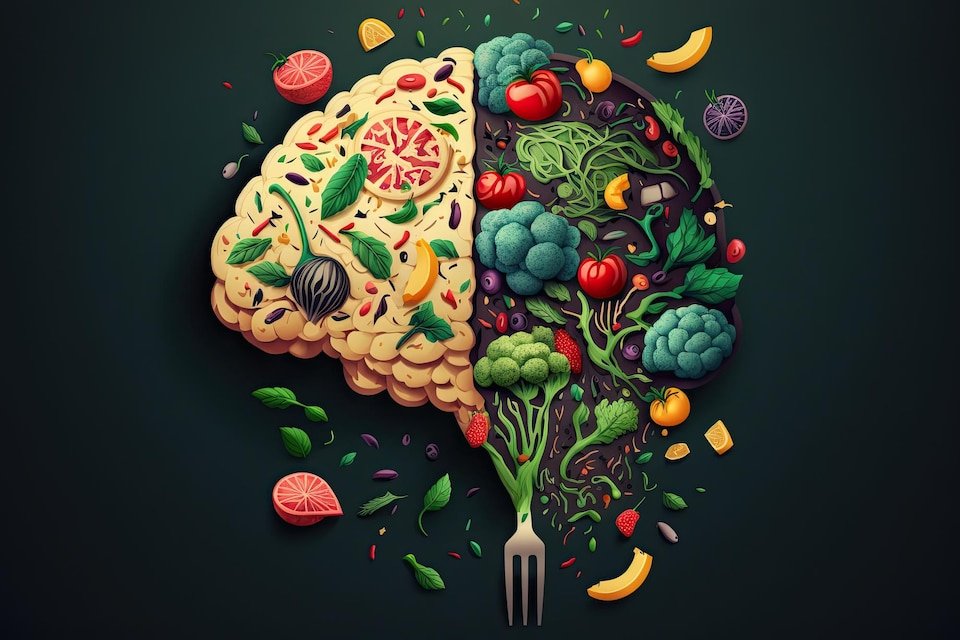The MIND Diet 101: The Best Diet for Your Brain

Welcome to our blog post on the MIND Diet, the best diet for your brain!
In this article, we will explore how your diet can have a profound impact on your brain health and cognitive abilities.
So, if you’ve ever wondered what foods you should be eating to boost your brainpower, you’ve come to the right place!
The MIND Diet, which stands for Mediterranean-DASH Diet Intervention for Neurodegenerative Delay, is a hybrid diet that combines the principles of the Mediterranean Diet and the DASH (Dietary Approaches to Stop Hypertension) Diet.
It has gained significant attention in recent years for its potential to promote brain health and reduce the risk of cognitive decline.
The Mediterranean Diet is a plant-based diet that emphasizes fruits, vegetables, whole grains, and healthy fats.
The DASH Diet is a low-sodium diet that is designed to help people with high blood pressure. The MIND Diet combines the best of both diets, providing a nutrient-rich and brain-healthy eating plan.
In this article, we will delve deeper into the origins and research behind the MIND Diet, exploring the key components that make it so effective.
We’ll also discuss the specific foods you should be including in your diet, such as berries, leafy green vegetables, whole grains, healthy fats, and fish. Additionally, we’ll cover the foods you should limit or avoid to maintain a healthy brain.
But the MIND Diet isn’t just about what you eat; it’s also about adopting a long-term lifestyle change.
We’ll provide you with practical tips on how to incorporate the MIND Diet into your daily routine, including grocery shopping advice and delicious, easy-to-make recipes that follow the principles of the diet.
To truly optimize your brain health, we’ll touch on additional lifestyle factors that go hand in hand with the MIND Diet. We’ll explore the importance of physical exercise, quality sleep, and mental stimulation in promoting a sharp and resilient mind.
So, get ready to embark on a journey to enhance your brain health through the power of the MIND Diet. Together, we’ll uncover the secrets of feeding your brain the right way and taking proactive steps towards a healthier and more vibrant life!
Understanding the MIND Diet
The MIND Diet has gained popularity for its potential to boost brain health and reduce the risk of cognitive decline. Let’s take a closer look at the origins and research behind this remarkable diet.
The MIND Diet is a combination of two well-known diets: the Mediterranean Diet and the DASH Diet.
The Mediterranean Diet has long been associated with various health benefits, including a reduced risk of heart disease and improved brain health.
On the other hand, the DASH Diet, which stands for Dietary Approaches to Stop Hypertension, focuses on reducing high blood pressure and promoting overall heart health.
Researchers recognized the potential synergistic effects of these two diets and designed the MIND Diet specifically to target brain health.
Multiple studies have shown promising results, indicating that following the MIND Diet may reduce the risk of Alzheimer’s disease and slow down cognitive decline.
The MIND Diet emphasizes consuming specific brain-boosting foods while limiting or avoiding others. By following this diet, you can provide your brain with the necessary nutrients it needs to function optimally.
Exploring Brain-Boosting Foods

Now that we have a better understanding of the MIND Diet, let’s dive into the specific foods that can enhance your brain health.
Incorporating these brain-boosting foods into your diet can have a positive impact on your cognitive abilities and overall brain function.
Berries: Nature’s Superfood for the Brain
Berries, such as blueberries, strawberries, and blackberries, are often referred to as “superfoods” for the brain.
They are rich in antioxidants, which help protect the brain from oxidative stress and inflammation. Antioxidants also play a vital role in maintaining healthy brain cells and promoting communication between them.
Leafy Green Vegetables: Powerhouses of Nutrition
Leafy green vegetables, including spinach, kale, and Swiss chard, are packed with essential nutrients that support brain health.
These vegetables are excellent sources of vitamins A, C, and K, as well as folate and fiber.
They also contain antioxidants and other compounds that help reduce inflammation and support the growth of new brain cells.
Whole Grains: Fueling Your Cognitive Abilities
Whole grains, such as brown rice, quinoa, and whole wheat bread, provide a steady source of energy for the brain.
They are rich in fiber, vitamins, minerals, and antioxidants. Whole grains release glucose slowly, ensuring a steady supply of fuel for the brain, which is essential for maintaining concentration and mental clarity.
Healthy Fats: Nourishing Your Brain
Including healthy fats in your diet is crucial for optimal brain function. Foods like avocados, nuts, seeds, and olive oil are abundant in monounsaturated fats and omega-3 fatty acids.
These nutrients support brain cell growth, reduce inflammation, and promote good blood flow to the brain.
Fish: A Source of Omega-3 Fatty Acids
Fatty fish, such as salmon, mackerel, and sardines, are excellent sources of omega-3 fatty acids. Omega-3s are essential for brain health, as they contribute to the structure of brain cells and help regulate neurotransmitters, which are responsible for communication between brain cells.
Consuming fish regularly has been associated with a reduced risk of cognitive decline and improved memory.
Recommended Food Groups and Portion Sizes
Now that we’ve explored the brain-boosting foods, let’s delve into the recommended food groups and portion sizes for the MIND Diet.
Incorporating these foods in the right proportions will help you optimize your brain health.
Incorporating Fruits and Vegetables
Fruits and vegetables are at the core of the MIND Diet. Aim to include a variety of colorful fruits and vegetables in your daily meals.
Berries, leafy greens, and other brightly colored options are particularly beneficial for brain health.
As a general rule, fill half of your plate with these nutrient-rich foods. Whether you enjoy them fresh, frozen, or in smoothies, make sure to include them as a key component of your meals.
Embracing Whole Grains
Whole grains provide the necessary energy and nutrients for your brain. When selecting grains, opt for whole grain options such as brown rice, quinoa, and whole wheat bread.
These contain more fiber, vitamins, and minerals compared to refined grains. Aim to make at least half of your grains whole grains.
Swap out refined grain products with whole grain alternatives in your meals to maximize their brain-boosting potential.
Choosing Healthy Fats
Healthy fats play a crucial role in supporting brain function. Incorporate sources of healthy fats into your diet, such as avocados, nuts, seeds, and olive oil.
These fats provide essential nutrients and contribute to brain cell development and communication.
However, remember that fats are calorie-dense, so moderation is key. Aim for a handful of nuts, a tablespoon of olive oil, or a quarter of an avocado as part of your daily intake.
Incorporating Fish and Poultry
Fish and poultry are excellent sources of protein, which is essential for brain health. Fatty fish, like salmon, mackerel, and sardines, are particularly beneficial due to their omega-3 fatty acid content.
Aim to include fish at least twice a week as part of your protein sources. Poultry, such as chicken and turkey, is also a healthy protein option. Opt for skinless cuts and vary your cooking methods to keep your meals interesting.
Moderating Red Meat and Sweets
While the MIND Diet emphasizes brain-healthy foods, it also recommends moderation when it comes to certain food groups. Red meat, for example, should be consumed in moderation.
Choose lean cuts and limit your intake to a few times per month. Similarly, sweets and sugary treats should be enjoyed sparingly.
Satisfy your sweet tooth with naturally sweet options like berries or indulge occasionally in small portions of your favorite treats.
Remember, portion sizes play a crucial role in maintaining a balanced diet. Be mindful of your serving sizes to ensure you’re getting the right amounts of each food group without overdoing it.
Balancing your plate with a variety of brain-boosting foods in the recommended proportions will help you achieve optimal brain health through the MIND Diet.
Foods to Limit or Avoid

While the MIND Diet focuses on incorporating brain-boosting foods, there are certain foods you should limit or avoid to optimize your brain health. Let’s take a closer look at these food groups.
Highly Processed Foods and Added Sugars
Highly processed foods and those with added sugars should be limited in your diet. These include sugary snacks, processed meats, sugary beverages, and pre-packaged meals.
These foods often lack essential nutrients and can lead to inflammation and oxidative stress in the body. Instead, opt for whole, unprocessed foods that are rich in nutrients and free from added sugars.
Saturated and Trans Fats
Saturated and trans fats are fats that should be limited in the MIND Diet. These fats are commonly found in fried foods, fatty cuts of meat, full-fat dairy products, and some processed snacks.
Consuming high amounts of saturated and trans fats can increase the risk of heart disease and negatively impact brain health. Choose healthier fat options, such as those found in avocados, nuts, and olive oil, instead.
Reducing Sodium Intake
Excessive sodium intake can contribute to high blood pressure, which is a risk factor for heart disease and may negatively impact brain health.
Be mindful of your sodium consumption by reducing the amount of salt you add during cooking and avoiding heavily salted processed foods. Instead, use herbs, spices, and other flavor-enhancing ingredients to add taste to your meals.
How to Follow the MIND Diet
Incorporating the MIND Diet into your daily life doesn’t have to be complicated. Here are some practical tips to help you follow the diet and improve your brain health:
Practical Tips for Grocery Shopping
- Make a shopping list: Plan your meals ahead and create a shopping list to ensure you have all the necessary ingredients for brain-healthy meals.
- Shop the perimeter: Focus on fresh produce, whole grains, lean proteins, and healthy fats found along the perimeter of the grocery store.
- Read labels: Pay attention to food labels and choose products that are low in added sugars, saturated fats, and sodium.
- Experiment with new foods: Explore different fruits, vegetables, and grains to add variety to your diet and discover new favorites.
Simple and Delicious MIND Diet Recipes
Incorporating the MIND Diet doesn’t mean sacrificing flavor. Here are a few simple and delicious MIND Diet-inspired recipes to get you started:
- Berry and Spinach Salad with Walnuts: Combine fresh berries, spinach, and toasted walnuts for a refreshing and nutritious salad.
- Baked Salmon with Herbs: Season salmon fillets with herbs like dill, lemon zest, and garlic, then bake until flaky and tender.
- Mediterranean Quinoa Bowl: Toss cooked quinoa with chopped vegetables, olives, feta cheese, and a drizzle of olive oil for a Mediterranean-inspired bowl.
Making Long-Term Lifestyle Changes
The MIND Diet is not just a short-term fix; it’s a lifestyle change that can benefit your brain health in the long run. Here are some tips to help you make lasting changes:
- Start gradually: Introduce one or two brain-healthy foods at a time and gradually increase their presence in your diet.
- Set realistic goals: Set achievable goals and track your progress to stay motivated.
- Stay consistent: Aim to make the MIND Diet a consistent part of your daily life by planning meals, preparing in advance, and staying committed to your health goals.
- Seek support: Share your journey with friends, family, or join a community of like-minded individuals for added support and motivation.
Additional Lifestyle Factors for Brain Health

In addition to following the MIND Diet, certain lifestyle factors can further enhance your brain health and overall cognitive abilities.
Let’s explore these factors and their importance in maintaining a sharp and resilient mind.
Physical Exercise and Brain Function
Regular physical exercise not only benefits your body but also has a positive impact on your brain health.
Engaging in aerobic exercises, such as walking, jogging, or dancing, increases blood flow to the brain, promotes the growth of new brain cells, and improves cognitive function.
Aim for at least 150 minutes of moderate-intensity exercise or 75 minutes of vigorous exercise per week to reap the brain-boosting benefits.
The Role of Sleep in Cognitive Health
Quality sleep plays a vital role in brain health and cognitive function. During sleep, your brain consolidates memories, processes information, and repairs itself.
Lack of sleep can impair cognitive abilities, affect mood, and increase the risk of various health conditions. Aim for 7 to 9 hours of quality sleep each night to ensure optimal brain performance and overall well-being.
Mental Stimulation and Brain Exercises
Keeping your brain active and engaged is essential for maintaining cognitive health. Engage in activities that challenge your brain, such as puzzles, reading, learning a new language, or playing musical instruments.
These activities stimulate different areas of your brain and promote neural connections. Additionally, social interactions and engaging in meaningful conversations can provide mental stimulation and support overall brain health.
By incorporating physical exercise, quality sleep, and mental stimulation into your lifestyle, you can enhance the benefits of the MIND Diet and promote optimal brain health.
- Read Also: The Mediterranean Diet 101: A Healthy and Sustainable Way to Eat
- Read Also: The Vegan Diet 101: Everything You Need to Know to Get Started
- Read Also: The Paleo Diet 101: The Science Behind the Benefits
Conclusion
Congratulations! You’ve reached the end of our journey through the MIND Diet and its impact on brain health.
By adopting this brain-boosting diet and incorporating healthy lifestyle habits, you’re taking proactive steps towards a healthier and more vibrant life.
The MIND Diet, with its emphasis on brain-healthy foods like berries, leafy greens, whole grains, healthy fats, and fish, provides a solid foundation for nourishing your brain.
By following the MIND Diet, you can supply your brain with the essential nutrients it needs to function optimally, potentially reducing the risk of cognitive decline and promoting long-term brain health.
Remember, the MIND Diet is not just a temporary fix but a long-term lifestyle change. Making small, gradual changes to your diet and incorporating brain-healthy foods in the recommended proportions can have a significant impact on your brain health over time.
Alongside the diet, don’t forget the importance of regular physical exercise, quality sleep, and mental stimulation, as these factors further enhance brain function.
As you embark on your journey to optimize brain health, stay consistent and be patient with yourself. Small steps and sustainable changes lead to long-lasting results.
Share your progress with friends and family, and seek support from like-minded individuals to stay motivated along the way.
Remember, you have the power to nourish and nurture your brain through the foods you choose and the lifestyle habits you embrace. By prioritizing brain health, you’re investing in a brighter future for yourself and those around you.
So, let’s raise a toast to the power of the MIND Diet and the incredible potential it holds for boosting brain health. Cheers to a sharper mind, enhanced cognitive abilities, and a healthier brain!
FAQs
What do you eat for breakfast on the MIND diet?
A brain-healthy breakfast on the MIND diet can include options like oatmeal topped with berries and a sprinkle of nuts, a vegetable omelet with whole grain toast, or Greek yogurt with fresh fruit and a drizzle of honey. These choices provide a combination of whole grains, fruits, vegetables, and healthy fats to kick-start your day.
Can you eat eggs on the MIND diet?
Yes, eggs can be included as part of the MIND diet. They are a good source of protein and nutrients. However, it’s recommended to consume them in moderation and choose healthier cooking methods like boiling or poaching instead of frying.
Does the MIND diet really work?
The MIND diet is based on scientific research and incorporates brain-healthy foods that have been associated with a reduced risk of cognitive decline. While it’s not a guaranteed solution, adopting the MIND diet can potentially contribute to better brain health when combined with other lifestyle factors like regular exercise and quality sleep.
Is peanut butter on the MIND diet?
Peanut butter can be enjoyed in moderation on the MIND diet. Opt for natural peanut butter without added sugars or hydrogenated oils. Peanut butter is a source of healthy fats and protein, but it’s important to pay attention to portion sizes due to its calorie content.
What cheese is OK on the MIND diet?
The MIND diet recommends consuming cheese in moderation. When selecting cheese, opt for low-fat or reduced-fat options like mozzarella, feta, or cottage cheese. These choices provide protein and calcium without excessive saturated fat content.
What are the negatives of the MIND diet?
While the MIND diet promotes brain-healthy foods, it may not suit everyone’s dietary preferences or restrictions. The diet may require adjustments if you have specific dietary needs, such as vegetarianism or gluten intolerance. It’s always recommended to consult with a healthcare professional or registered dietitian before making significant changes to your diet.
Can you drink coffee on the MIND diet?
Yes, moderate coffee consumption is generally acceptable on the MIND diet. However, it’s important to avoid excessive intake or adding excessive amounts of sugar or cream. Opt for black coffee or use moderate amounts of natural sweeteners like honey or a splash of milk or unsweetened plant-based milk.




